Windhawk is a mod-based universal customization solution for Windows
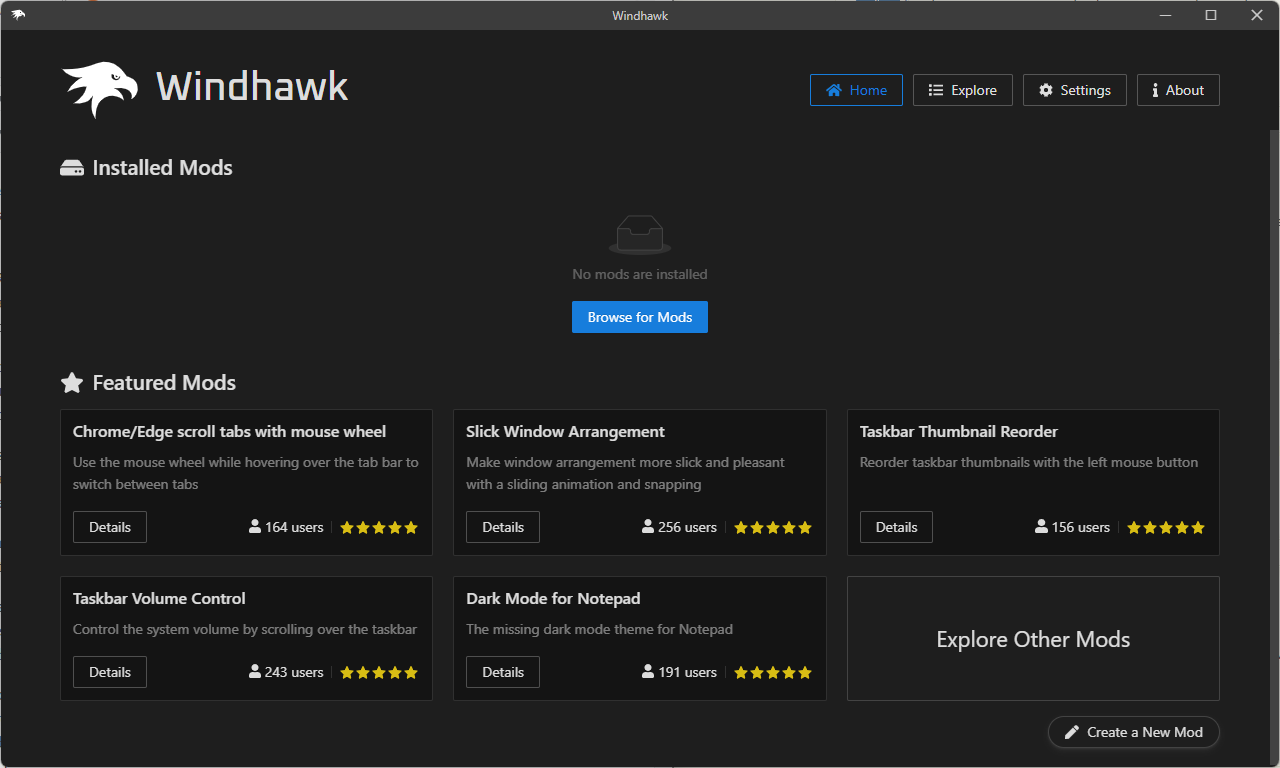
With every new Windows release, it appears that Microsoft is removing customization options. Windhawk is an open source solution that attempts to bring back customizations and new ones for Windows.

Designed by Ramen Software, known for other applications such as 7+ Taskbar Tweaker or Textify, Windhawk was developed to improve the process of adding customizations to programs and the operating system.
The developers own taskbar tweaker for Windows serves as an example. To create such an app, it is necessary to understand some of the inner workings of the operating system, such as process injection or function hooking.
All developers who want to create customization programs need to learn and understand these. Windhawk was created as a core for customizations that everyone may contribute to, without having to develop all these other functions as well.
One of the main ideas of Windhawk is its modular design. Developers may create mods, modifications, which users of Windhawk may then download and apply on their systems.
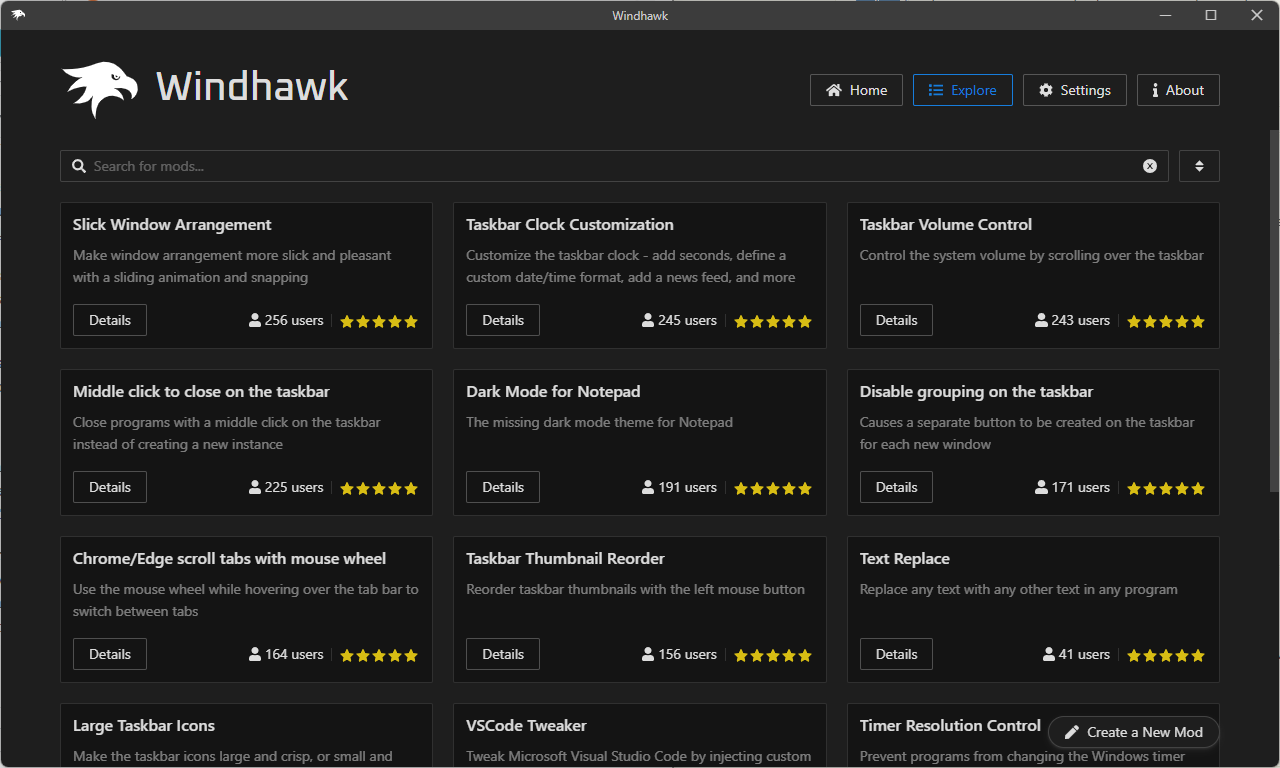
Windhawk may be installed or it may be run as a portable application. The main interface of the program lists several featured modifications, such as Dark Mode for Notepad, adding mouse over volume controls or scrolling Chrome and Edge tabs with the mouse wheel.
A click on "browse for mods" displays all available mods at the time. These include a number of other interesting tweaks, including the option to disable grouping on the taskbar, enabling the option to reorder thumbnails on the taskbar with the left mouse, or adding text labels for programs on the taskbar on Windows 11.
A click on the details button opens a new page with installation options, the source code, and a preview of the tweak. Some but not all of the available mods list compatibility information.
There is also a fork option to create a custom version of a mod on the local system. Users who don't want any development related options in the Windhawk interface may turn it off in the settings.
A click on install displays a warning that modifications may damage the system, violate privacy or do other harm. Select "accept risk and install" to go ahead with the installation, or cancel to stop it.
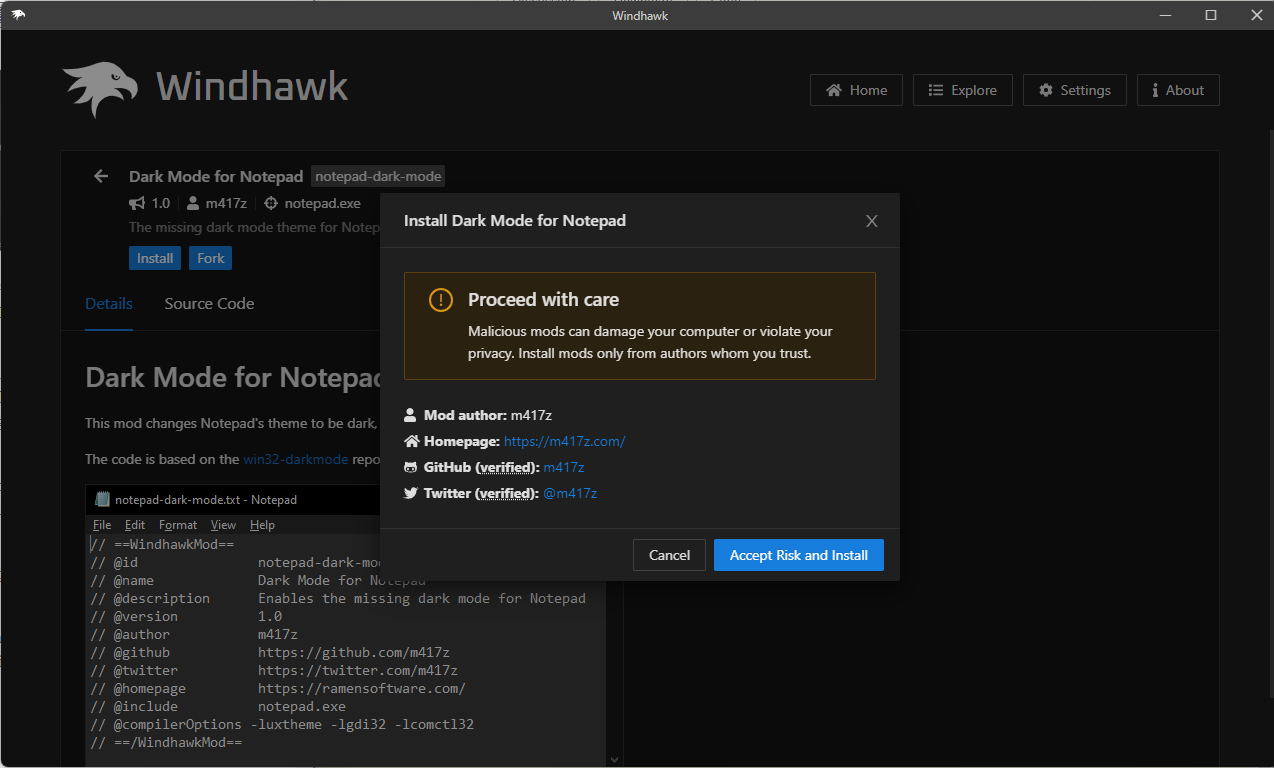
Installations are swift and happen in the background. The install button changes to an uninstall button to remove the mod again from the system. It may take a moment for the tweaks to become available on the system.
Closing Words
Windhawk is an interesting customization application for Windows that includes a good dozen modifications already. The application's success depends largely on support from other developers, and it remains to be seen how many third-party mods will be contributed to the project in the coming months and years.
In the best case, it could turn into a huge marketplace of mods, similar to browser extension stores or userscript repositories.
Now You: have you tried Windhawk? What is your take on the idea? (via Deskmodder)














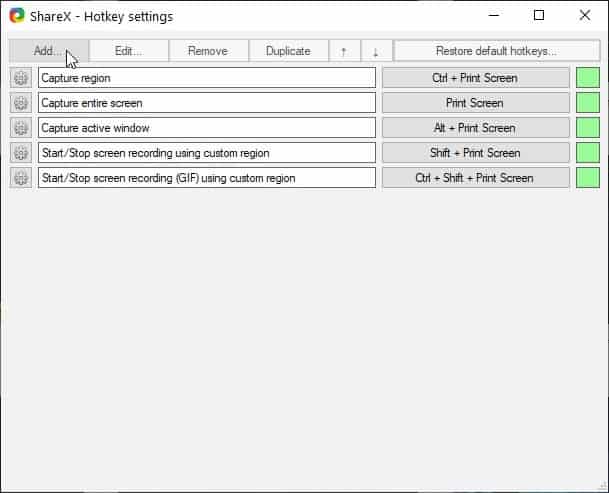
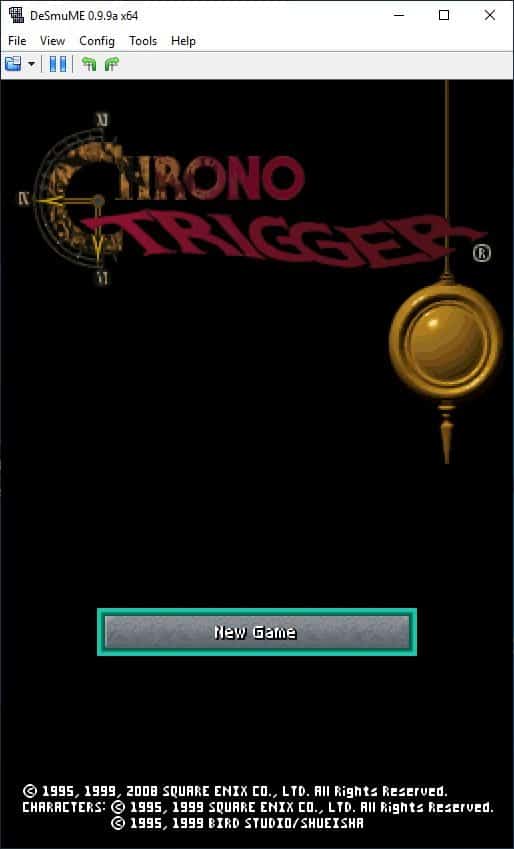
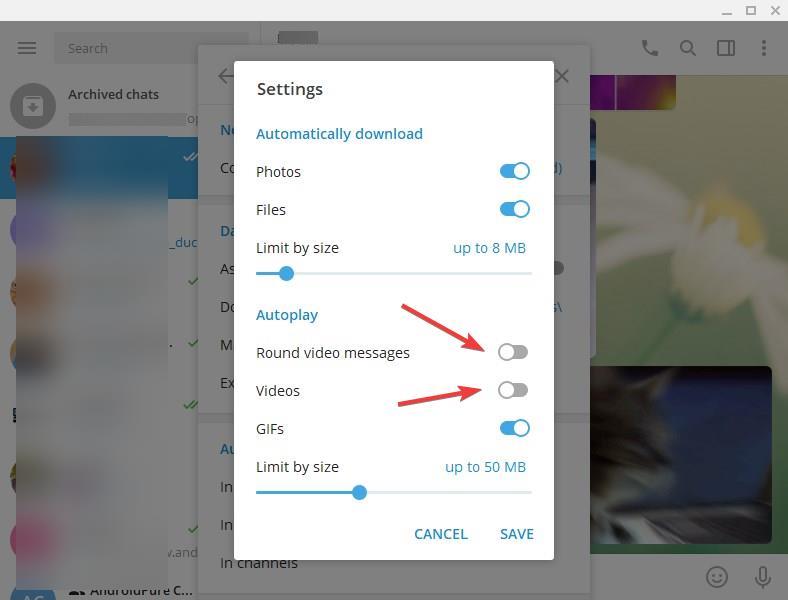











Hello, how do I remove Windhawk from my PC? I can’t do so by deleting the whole portable folder. Please help.
Can someone answer my query please? I am at a loss how to remove Windhawk from my PC?
Did you install it or use the portable version?
This app rings a distant, faint bell. The concept. The app has been around a year or few, I expect.
It seems like a great idea.
I’d be forced to hack around trying to make Mint what I want my OS to be if it were not for the following (probably more):
Winaero Tweaker
7+ Taskbar Tweaker
Flat out rejecting Microsoft’s perpetual Beta release cycle
OpenShell
PatchMyPC
Libre Office
Firefox
Adding to those tools, instead of suffering the dumbed down / spying up versions of Windows offered since WinOSX is the way to go.
If I wanted to run Mac OS I’d mortgage my internal organs to do so instead of running Windows MacHeaven.
I hope Windhawk takes off ?
I can see why people would be concerned but at the very least the source code is clearly available but having said that if windhawk auto updates the scripts/mods then we may have a problem in the similar way we did with extensions. Perhaps a notification of updates and clear and visible source edits/change highlighted so people can be a little more informed. It’s not full proof especially for those of us that don’t know how to decipher source code but it is at least much more transparent in what they do.
Authors can go rogue and authors can sell their name and assets off to a shadow programmer in similar ways to extensions have.
At the end of the day so many people trust random software and tweaking software. There are dozens of applications on github let alone everywhere else that we blindly download without much question.
In regards to the notion that adding more things creates more problems for windows then perhaps that may be true but I think its fairly evident that Microsoft needs no help at all to cause issues for end users. There was an article just a few days ago here about audio issues that was caused by some official Microsoft update and one could argue that if Microsoft wasn’t so inept we wouldn’t need so many tweaks and such.
I have been using it for a few months to disable grouping on the taskbar, and to enable the taskbar volume control. It has been working perfectly.
“Microsoft is removing customization options. ”
In Windows 11 is event removed functionality of taskbar, systray, “start menu”, so would be nice to have mod which brings back them.
Like today’s governments, MIcrosoft draws its reins tighter and tighter. Glad to hear there are some folks out there trying to help us resist. Lack of customization is the reason I have stuck with Windows 7. Just sayin’.
I’m on Windows 7a s well. Its the last usable OS from Microsoft.
It’s clear there are a lot of untalented morons over at Microsoft that don’t know Windows or how it’s used. Microsoft should open-source Windows. We would have a usable operating system in less than a few weeks.
Nope, haven’t tried Windhawk–rather doubt I will because of obvious privacy and security issues. Who will be vetting the new mods? Anyone?
In the “best case,” it could turn into a huge marketplace of mods, similar to browser extension stores or userscript repositories.
Worst case? “A click on install displays a warning that ‘modifications may damage the system,’ violate privacy or do other harm. Select “accept risk and install” to go ahead with the installation, or cancel to stop it.”
Wise to issue a caveat that exempts Windhawk from any “malicious” mods or damage to a user’s system.
From reading many posts in the past, what I’ve sensed is users who modify heavily modify their systems tend to complain about issues with Windows Updates and Windows in general.
It would be difficult to show a cause-effect relationship between “heavy duty” modifications and Windows errors, but my guess-hunch-intuition says, “The more one modifies the Windows base system, the more problems he/she is going to have later with updates and upgrades.”
The few “mods” shown in the screenshot don’t offer anything of value for me; others may praise Windhawk for the effort.
Risk/reward ratio? Not in my favor.
I think this app is quite dangerous. There were already news about a lot of browser extensions turned to be harmful after several updates. Windhawk does the same thing but at Windows level, I can’t even imagine what horrible things those extensions can done to the OS.
Also did anyone forgot about npm breach? That’s the power of open source for you.
That same rule applies to all random open source software and libraries you get off github or whatever other open source repository. Did you bother to find someone to “vet” how safe each and every opensource stuff you use? Or did you yourself examine each and every line of code? The same thing applies here.
The application is open source. You yourself can read the source code and figure out how it all works. That includes all the mods. All the mods have a source code that shows what it does.
Therefore if you want someone vetting the code, go and pay someone to do it instead of complaining to the internet. Big open source projects like Firefox have people on payroll to vet the code so that it isn’t malicious. Mozilla earns money to do so. Many big companies that use open source libraries also have people on payroll to check the source code of those libraries and the changes being made, on top of the open source community developers volunteering to do so. Small projects like this that are free? If you don’t trust the developer, why don’t you come out money from your own pocket if you really want more “reputable” humans or companies to examine the code. Or you know, maybe read the code yourself and vet it yourself?
Look I’m not saying all because something is open source you should absolutely trust it with your life. But your concerns can be addressed simply by the user spending time reading and understanding the source code and how everything works, or paying someone to do so. Or you know, just trust them like you trust every other open source project out there, big and small.
Yes, I do understand, and because I don’t know coding enough, I’m not volunteering to create new mods or vet existing mods or mods that may come in the future. First reading rather intrigued me since I use some open source programs and feel comfortable enough with the developers [no complaint was ever made if you re-read the post].
The situation with Windhawk spells different for me: In essence, we, Windhawk, have developed a new program that will help with customization; however, we are immune from any liability with regard to a contributed mod damaging a computer system should any developer develop a mod with malicious code or simply bad coding.”
If the following line doesn’t raise a flag for users, then . . . I don’t know how to say, “Beware.”
“It could turn into a huge marketplace of mods, similar to browser extension stores.” Many browser extensions are removed from Mozilla and Google for one reason–they are malicious and privacy invasive or don’t follow the guidelines provided.
One example: VLC. Wonderful. But the team doesn’t invite the entire community of programmers to play around with the code. I think, as I last read, one can volunteer. A volunteer is vetted and coached with observation before becoming a full team member.
Common sense.
May want to check the many articles from the past, either on gHacks or elsewhere, when hundreds of programs have been discarded from MS Store, Google Play, FF Extensions, etc. Like thousands!
And proprietary programs aren’t necessarily any better . . . .
As they say, “Just sayin!” Your computer; the choice is always yours.
Last thought: Check the requirements John Haller has over at Portable Apps. He runs a tight show which makes Portable Apps great!